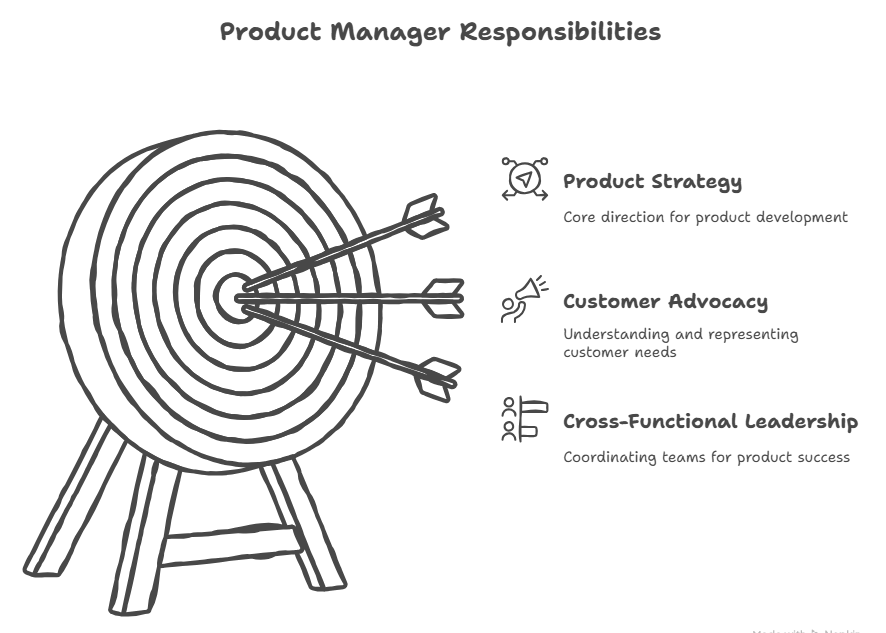What Does a Product Manager Do? Role and Responsibilities
Explore the multifaceted role of product managers, their core responsibilities, essential skills, and how they drive product success through strategic leadership.
What is a Product Manager?
A product manager (PM) is a professional role responsible for the development of products for an organization, known as the practice of product management. They serve as the central hub connecting customer needs, business objectives, and technical execution. Product managers define what success looks like for a product and guide cross-functional teams to deliver value to both customers and the business.
Think of a product manager as the product's CEO—they don't manage people directly but own the product's vision, strategy, and ultimate success. They balance strategic thinking with hands-on execution, making them critical to a product's development and market performance.
Core Responsibilities of a Product Manager

Strategic Planning and Vision
Product managers create a product strategy with insights collected during research to provide clear direction for product development. They define the product's vision, strategy, and roadmap to ensure it aligns with business goals and meets customer needs. This involves:
- Setting long-term product vision and objectives
- Developing product roadmaps that outline feature priorities
- Making strategic decisions about what to build and when
- Ensuring the product delivers value to both customers and the business
Customer Advocacy and Market Research
The role description for a product manager includes the responsibility to advocate for customers and their needs. Product managers spend significant time understanding customer pain points, conducting market research, and validating assumptions. This customer-centric approach ensures the product solves real problems and delivers meaningful value.
Cross-Functional Leadership
Product managers coordinate across multiple departments to bring products to life. They make sure that engineering, sales, marketing, and customer service are working as a team to meet business and customer goals. This requires exceptional communication skills and the ability to align diverse stakeholders around a common vision.
Key Skills for Product Management Success
Strategic Thinking and Business Acumen
The role requires a mix of skills, including leadership, communication, and market research. Product managers need strong business sense to make decisions that balance customer needs with company objectives. They must understand market dynamics, competitive landscapes, and business metrics to guide product decisions effectively.
Technical and Analytical Skills
While not necessarily coding experts, product managers need enough technical understanding to collaborate effectively with engineering teams. They also rely on data analysis to inform decisions, measure success, and identify opportunities for improvement. Analytical thinking helps them prioritize features and make evidence-based decisions.
Communication and Influence
Product managers spend considerable time communicating with stakeholders, presenting roadmaps, and aligning teams. Documentation for presentations and data sharing are a large part of the product management role. Strong communication skills enable them to articulate the product vision clearly and build consensus across the organization.
Product Manager vs Related Roles
Product Manager vs Product Owner
In agile software development environments, product delivery responsibilities are taken on by a product owner, a project role that a product or engineering manager can perform to ensure successful implementation of tactical plans. While product managers focus on strategic vision and market success, product owners typically handle day-to-day development execution and backlog management.
Product Manager vs Product Marketing Manager
Product managers should not be confused with product marketing managers, who are responsible for the outbound marketing activities of the product, not development and cross-functional execution. While product managers define what to build and why, product marketing managers focus on bringing finished products to market and driving adoption.
Tools for Effective Product Management
Successful product managers leverage various tools to organize their work and communicate effectively. From roadmapping software to analytics platforms, the right tools can streamline product management processes and enhance collaboration.
For visual thinkers and product managers looking to organize complex product strategies, ClipMind offers AI-powered mind mapping tools that can help structure product visions, feature priorities, and customer insights. The platform's AI SWOT Analyzer and Product Idea Brainstormer are particularly useful for product managers developing new concepts and evaluating opportunities.
The Evolving Role of Product Management
What will be considered a product manager role at one company might not be considered a product role at another. The field continues to evolve as organizations recognize the value of dedicated product leadership. Today's product managers are increasingly data-driven, customer-focused, and strategic partners in driving business growth.
The most successful product managers combine deep customer empathy with strong business judgment and technical understanding. They navigate complexity, make tough prioritization decisions, and ultimately deliver products that customers love and that drive business success.